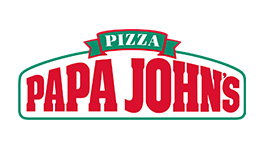Papa John’s® Pizza Ingredients

By Jeanne Yacoubou, MS
The Vegetarian Resource Group received an email from a reader about Papa John’s pizza. He asked: Do the Papa John’s pizza doughs…contain any animal products? There is some confusion about their source of “whey protein concentrate”?
We responded in part with information from a VRG article on rennet.
“Approximately 90-95% of the rennet used to curdle milk into cheese remains in the whey.”
We also told our reader that most rennet used commercially in the USA is microbial, not animal-derived. Long ago, genetic material was isolated from rennet taken from a calf’s stomach and inserted into microbial genetic material to produce “microbial rennet.” It may also be called “vegetarian rennet” on some labels.
Isolating rennet from a calf’s stomach is NOT done for each batch of “microbial” enzyme today.
There may be some “microbial rennet” made differently, where no calf gene was ever used, even at the very start of the microbial line, decades ago. In this case, ALL genetic transfer occurs between microbes.
But this method is uncommon. It’s not the way that the majority of rennet is manufactured on a commercial basis. Companies may not be willing to find out definitively which way was used if you inquired. Or, they may say “it’s proprietary.” More often than not, they’ll just say “microbial rennet” and leave it at that.
To answer the reader’s first question, The Vegetarian Resource Group turned to Papa John’s for an update. Unlike many restaurant chains, Papa John’s lists a direct link to its pizza ingredients on the bottom of its homepage:
In February 2020, we first sent in our questions through their website, and then called their customer service line. After a few inquiries, we were told:
“The 2-cheese blend, made of Parmesan and Romano cheeses, is made with animal rennet. The mozzarella cheese is made with microbial enzymes. The 3-cheese blend, consisting of Asiago, fontina and provolone cheeses, is made with animal rennet.”
We then asked about the natural flavors in the two types of pizza doughs listed on their website.
Here is an answer from their email with the subject line: “Rennet in Cheese, Animal Enzymes, Vegan Concerns.”
“Our nutritional, allergen and general ingredient information can be found on these pages:
http://www.papajohns.com/company/nutrition-allergen-information.html
http://www.papajohns.com/allergens/papa-johns-allergen-guide.html
The majority of our products contain biosynthesized and/or vegetable-derived enzymes, including our mozzarella cheese. Our mozzarella cheese contains no animal-derived enzymes. The enzyme used is from a microbial source. However, our two- and three-cheese blends do contain animal derived enzymes. There are no animal products in our original crust, pizza sauce, or pizza cheese (other than milk).
Our pizza dough contains fungal or bacterial derivatives.
Our garlic sauce contains lactic acid, which is not classified as an animal derivative because it has been fermented.
Blue cheese and ranch [dressings] do contain animal-derived rennet.
The rennet that is used in the Papa John’s Parmesan cheese is a GMO-free microbial rennet. It is not animal-derived. It would be suitable for vegetarian consumption.”
The Vegetarian Resource Group asked if the “fungal or bacterial derivatives” in the pizza dough, since they are not listed on the website’s ingredient statement, could be the natural flavors.
We also asked about the microbial rennet in the Parmesan cheese. Since we were told the cheese blend with Parmesan had been made with animal rennet, we wanted clarification on this point. We don’t have an answer to this question yet.
Based on a careful look at the Allergen Guide, which lists all menu items, and the information from the email that Papa John’s sent to us, (see above), The VRG believes that the Parmesan cheese containing the microbial rennet is in the Parmesan cheese packet and/or the cheese dipping sauce. (NOTE: We have not received confirmation from Papa John’s on this point.)
After a closer analysis of the pizza crust ingredients listed on the Papa John’s website and the email that Papa John’s sent (see above), it appears that the natural flavors are “fungal or bacterial derivatives.” They are not specifically listed as such, but by a process of elimination, The VRG concludes that the natural flavors are most likely microbial derivatives, and, therefore, not animal-derived. (NOTE: We have not received confirmation from Papa John’s on this point.)
Papa John’s Pizza Crusts
According to the Allergen Guide on Papa John’s site, along with information from the email we received (reprinted above), as well considering what we had discovered a few years ago, it appears that:
- Original Hand-Tossed dough is vegan.
- Thin Crust dough contains milk ingredients (whey).
- Gluten-Free dough contains milk and egg ingredients (whey and egg whites).
The VRG encourages readers who have questions not answered here to contact Papa John’s directly.
The contents of this posting, our website, and our other publications, including Vegetarian Journal, are not intended to provide personal medical advice. Medical advice should be obtained from a qualified health professional. We often depend on product and ingredient information from company statements. It is impossible to be 100% sure about a statement, info can change, people have different views, and mistakes can be made. Please use your best judgment about whether a product is suitable for you. To be sure, do further research or confirmation on your own. Everyone does the best they can, so don’t be judgmental or critical of yourself or others.
Information on other quick service chains is at https://www.vrg.org/fastfoodinfo.php
Information on vegetarian restaurants in the USA and Canada is at https://www.vrg.org/restaurant/index.php
Especially during these times, check the restaurant website or Facebook account to see if they are open or delivering. Restaurants are obviously having a very hard time, and they will greatly
appreciate your support.
